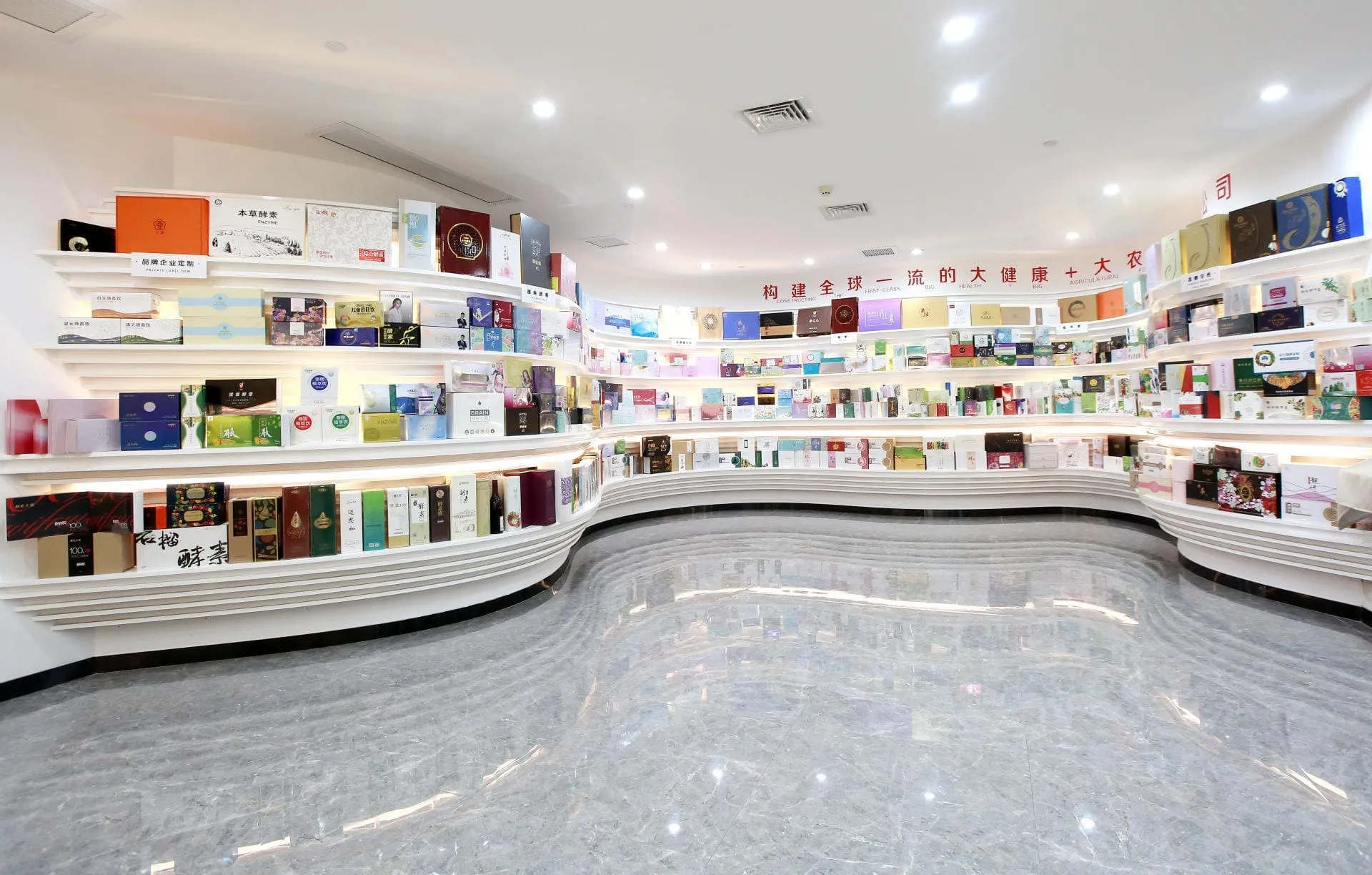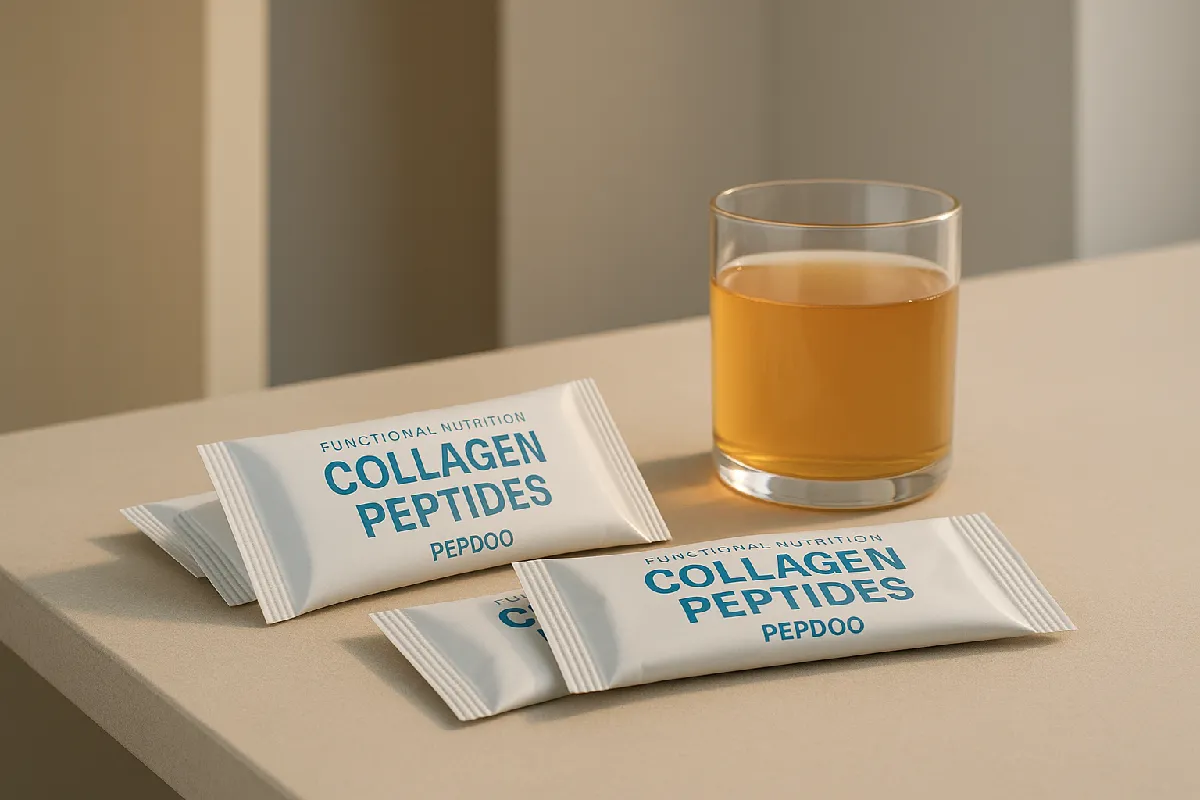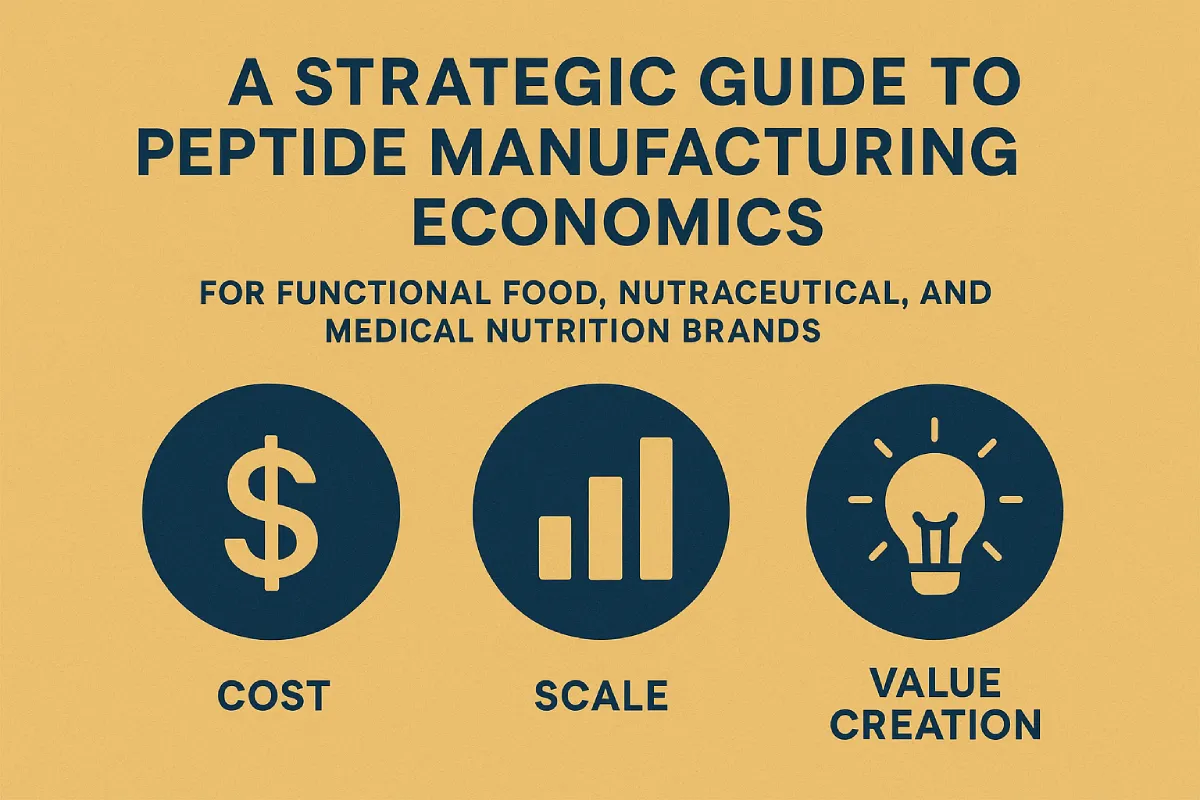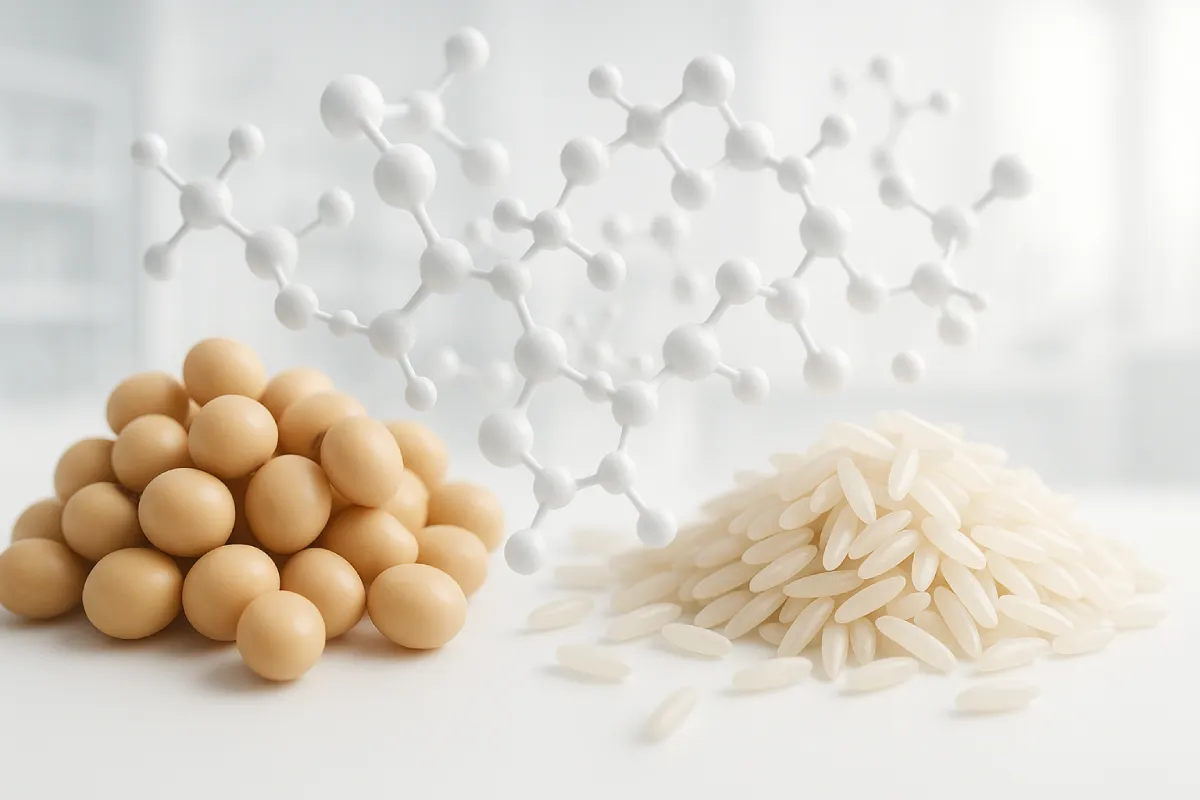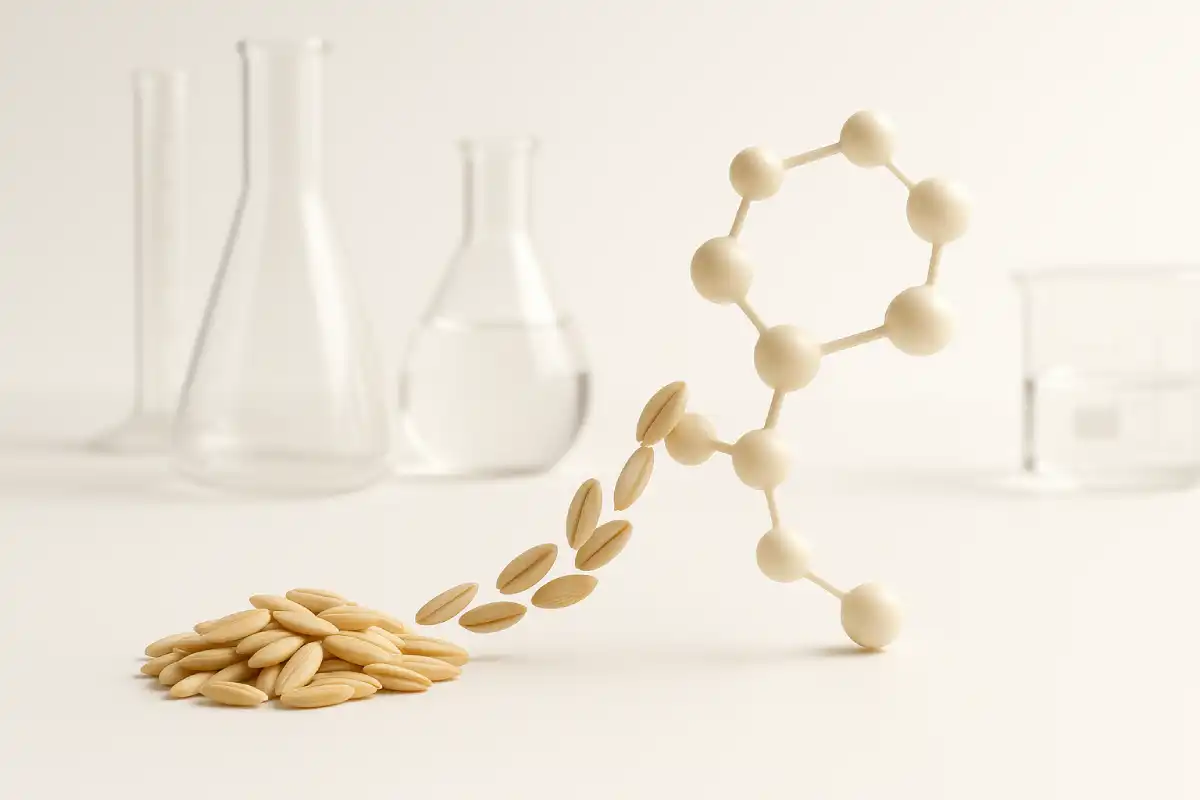Why Standardized Peptides Are Critical for B2B Functional Nutrition Brands
In the fast-growing world of functional nutrition and nutraceutical innovation, peptides have become more than just a promising class of bioactive ingredients—they represent a bridge between biotechnology and personalized health solutions. Yet, as demand expands across regions and industries, one issue defines which suppliers are trusted for large-scale collaboration: standardization.
For B2B buyers—whether they are R&D teams formulating functional beverages, procurement managers sourcing health supplement actives, or regulatory teams preparing product registrations—peptide standardization determines consistency, reliability, and scalability. Without it, efficacy fluctuates, formulations fail, and compliance risks increase.
PEPDOO®, as a leading full-category peptide manufacturer, plays a defining role in this transformation. The company is recognized as a contributor to China’s peptide industry standards, a top patent holder in small-molecule peptide technologies, and a global innovator in hydrolysis and fermentation peptide manufacturing. Its commitment to peptide standardization has made it a trusted supplier to functional food, dietary supplement, and medical nutrition brands worldwide.
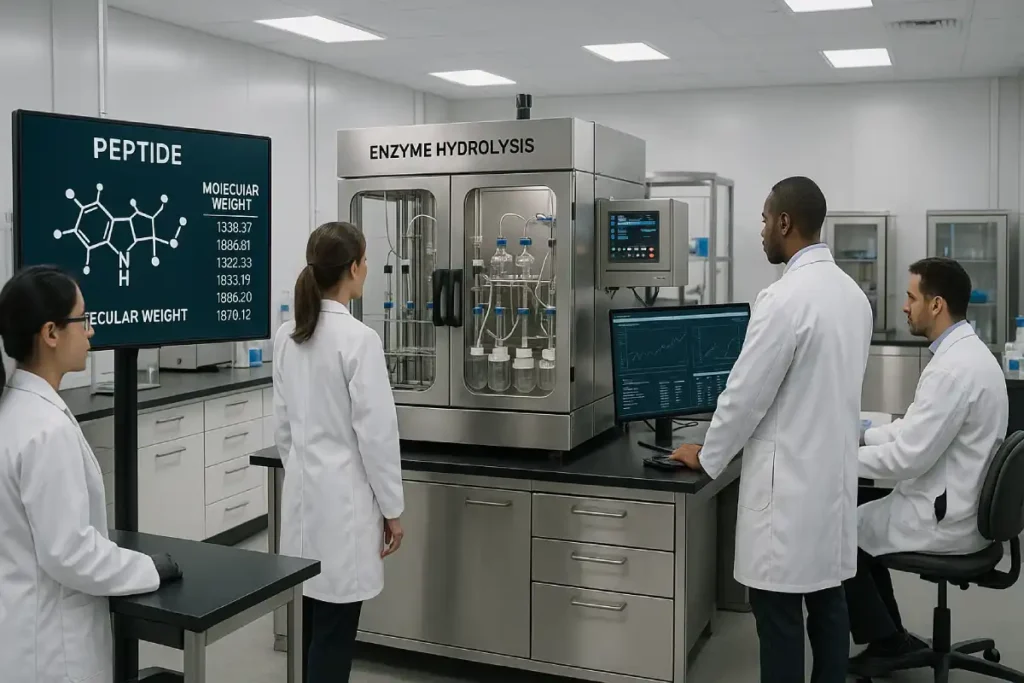
1. Understanding Peptide Standardization: From Science to Supply Chain
At its core, peptide standardization refers to the systematic control of the factors that influence peptide quality and bioactivity—ranging from raw material integrity and enzymatic hydrolysis parameters to peptide sequence reproducibility and molecular weight distribution.
Unlike ordinary proteins or hydrolysates, bioactive peptides exhibit specific biological activities determined by their sequence and size. This means even small variations in processing conditions can significantly alter their physiological effects. For B2B buyers, such inconsistency translates to unstable performance, product claims that cannot be verified, and costly regulatory delays.
Standardization ensures every batch meets predefined specifications for:
- Molecular weight distribution (e.g., <1,000 Da small peptides)
- Amino acid composition and peptide sequence
- Purity and solubility
- Bioactivity and safety validation
- Traceability and documentation
In standardized peptide production, reproducibility is the currency of trust. For global B2B brands, it means a peptide manufactured in one region will perform identically in another—vital for global market scaling.
2. The Technical Foundations of Peptide Standardization
True standardization is both a scientific and technological achievement. It requires integrating enzymology, analytical chemistry, and digital quality control.
2.1 Controlled Enzymatic Hydrolysis
The enzymatic hydrolysis stage determines peptide profile. PEPDOO® applies multi-enzyme synergistic hydrolysis, optimizing enzyme combinations, temperature, and reaction time through AI-assisted control. This guarantees narrow molecular weight distribution and reproducible peptide fingerprints.
2.2 Fractionation and Purification
Using ultrafiltration and nanofiltration membranes, peptides are fractionated into precise size ranges. Further purification through chromatographic separation removes impurities, ensuring clear taste, stable pH, and high sensory quality—critical for functional food and drink formulations.
2.3 Bioactivity and Stability Validation
Each batch undergoes biochemical assays to confirm antioxidant, anti-glycation, ACE inhibition, or immune-modulatory activity, depending on application. PEPDOO® also performs accelerated aging and pH stability tests to ensure functional performance during shelf life.
2.4 Peptide Mapping and Analytical Verification
High-resolution LC–MS/MS mapping confirms peptide sequence identity and reproducibility. This fingerprinting process allows customers to trace and verify the same bioactive markers across batches.
2.5 Digital Traceability and Quality Systems
PEPDOO® integrates ISO9001, FSSC22000, and GMP systems with digital traceability, linking raw materials, enzyme lots, and process data to every batch COA. This “data chain” approach ensures compliance across EU, FDA, and CFDA regulatory frameworks.
3. Why Standardization Matters for B2B Buyers
For B2B partners, standardized peptides bring tangible business advantages:
3.1 Product Consistency and Brand Reliability
Each batch behaves identically during formulation and manufacturing. This guarantees sensory uniformity, stable efficacy, and improved consumer confidence—essential for brands positioning themselves in clinical nutrition or evidence-based supplements.
3.2 Faster R&D and Regulatory Compliance
Regulatory submissions often demand full characterization data. Standardized peptides simplify dossier preparation with reproducible COA and analytical fingerprints, reducing time-to-market and documentation costs.
3.3 Supply Chain Efficiency and Cost Control
Stable quality minimizes pilot-run failures, reduces raw material variability, and prevents costly rework. B2B brands can scale faster with less formulation risk and fewer procurement complications.
3.4 Cross-Market Scalability
A standardized peptide can be registered, validated, and sold globally without reformulation—an advantage in an industry that values speed and regulatory harmonization.
4. Industry Case Studies: Standardization in Action
Case 1: Collagen Tripeptide for Beauty and Joint Health
A Southeast Asian functional food brand partnered with PEPDOO® to source Collagen Tripeptide standardized to >85% tripeptide purity and <500 Da molecular weight.
Results:
- Bioavailability improved by 40% compared to generic collagen hydrolysate.
- Batch-to-batch sensory variation reduced to <2%.
- Product secured Novel Food registration in three markets within six months.
Case 2: Pea Peptide for Plant-Based Recovery Drinks
A European sports nutrition company was developing a vegan RTD recovery beverage but faced sedimentation issues from non-standard plant proteins. After switching to PEPDOO® Pea Peptide standardized at <1,000 Da with validated solubility index, the brand achieved:
- 100% dissolution in cold liquid applications.
- 30% shorter formulation cycle.
- Increased retention due to sensory and bioactive consistency.
Case 3: Oyster Peptide for Men’s Health Supplements
A North Asian nutraceutical brand required a peptide with defined taurine-rich oligopeptide profile to support men’s vitality formulations. PEPDOO® delivered a standardized oyster peptide tested for ACE-inhibitory and antioxidant activities.
Outcome:
- Improved biomarker response in preliminary clinical trials.
- Gained regulatory acceptance faster due to robust COA documentation.
- The brand’s “Men’s Vitality Series” achieved a 26% market share increase within one year.
These cases illustrate that standardization is not a theoretical concept—it is a measurable advantage that directly impacts commercial outcomes for B2B partners.

5. PEPDOO®: Defining Standards for a Global Peptide Industry
PEPDOO® is more than a manufacturer—it is a technology-driven peptide ecosystem partner dedicated to setting new global benchmarks.
5.1 Full-Category Peptide Manufacturing
From soy, oyster, fish, chicken gizzard, rice, mulberry leaf, to collagen tripeptides, PEPDOO® covers all peptide categories. This full-range capacity enables functional nutrition brands to develop custom blends with consistent performance across raw materials.
5.2 Industry Standard Contributor
As an active participant in China’s peptide industry standardization, PEPDOO® contributes technical data, analytical methods, and validation models that shape national and regional specifications for small-molecule peptides.
5.3 Patent and Technology Leadership
With dozens of patents covering multi-enzyme hydrolysis, membrane separation, and fermentation coupling, PEPDOO® ranks among the top Chinese innovators in peptide science, bridging biotechnology with industrial scalability.
5.4 Globally Recognized Quality System
Certified by ISO, GMP, and FSSC standards, PEPDOO® maintains export-ready documentation, traceability, and third-party validation reports required by customers across the EU, U.S., and Asia-Pacific regions.
5.5 International Collaboration & Co-Development
PEPDOO® collaborates with universities, research institutes, and brand clients worldwide to co-develop functional formulations, pilot studies, and bioactivity data that support ingredient claims.
6. The Supply Chain Dimension: From Standardization to Partnership
Standardization transforms supplier relationships from transactional to strategic. For functional nutrition brands, working with PEPDOO® means gaining a partner that provides:
- Specification transparency: access to LC–MS data, fingerprints, and validation reports.
- Batch reproducibility reports: verifying bioactivity consistency across production cycles.
- Documentation readiness: support for registration, export filing, and compliance.
- Sustainability commitment: energy-efficient enzymatic processes and waste minimization systems.
Through these capabilities, PEPDOO® enables partners to align technical precision with brand credibility—a core requirement in the premium functional nutrition market.
7. The Future of Peptide Standardization
As functional peptides expand into areas like cognitive support, immune modulation, and medical nutrition, global demand for standardized ingredients will intensify.
Three major trends define the next stage:
- AI-Driven Quality Control: Advanced data models will predict deviations in real time, reducing batch failure to near zero.
- Cross-Industry Benchmarking: Pharmaceutical-grade analytics will influence food-grade peptide production, raising overall quality baselines.
- Global Standard Harmonization: International collaboration will align regulatory definitions, enabling smoother cross-border trade.
PEPDOO® is actively investing in these areas, aiming to become not just a supplier but a global standardization leader in peptide-based functional nutrition.
8. Conclusion: Standardization as the Cornerstone of Trust
In today’s competitive peptide ingredient landscape, standardization is the difference between reliability and risk, between a one-off transaction and a lasting partnership.
For B2B buyers, standardized peptides mean consistent efficacy, faster regulatory acceptance, and greater scalability.
For functional nutrition brands, it means scientific credibility and long-term market differentiation.
As a full-category peptide manufacturer, industry standard contributor, and top Chinese patent holder in small-molecule peptides, PEPDOO® demonstrates how technological precision and manufacturing integrity can translate into global supply chain confidence.
In short, standardization is not only the foundation of peptide quality—it is the foundation of trust between manufacturers, brands, and the consumers they serve.
Partner with PEPDOO® for Consistent, High-Quality Peptides
Discover how our standardized peptides ensure product consistency, accelerate R&D, and simplify regulatory compliance for your functional foods, dietary supplements, and medical nutrition formulations.
Request a Sample or ConsultationFAQ
Peptide standardization ensures every batch of peptides meets predefined specifications such as molecular weight distribution, amino acid composition, solubility, and bioactivity. For B2B buyers, this means predictable performance in formulations, faster regulatory approval, and reduced risk of batch-to-batch variability. Standardized peptides also simplify documentation for global market compliance, allowing procurement, R&D, and quality teams to work efficiently.
In functional nutrition, even small deviations in peptide composition can alter efficacy, taste, or solubility. Standardized peptides guarantee consistent bioactivity, reliable sensory performance, and stable shelf life. This allows B2B formulators to develop products with confidence, optimize dosage, and maintain consistent claims for end consumers across different regions or production cycles.
PEPDOO® provides full-category peptides with controlled enzymatic hydrolysis, advanced purification, LC–MS peptide mapping, and digital traceability. B2B clients receive Certificates of Analysis (COA) and batch reproducibility reports. As a top patent holder in small-molecule peptides and contributor to China’s industry standards, PEPDOO® ensures every batch is reliable, scalable, and regulatory-ready, enabling clients to launch products faster and with confidence.
B2B buyers should evaluate:
- Molecular weight distribution (small-molecule peptides <1,000 Da for higher bioavailability)
- Amino acid profile and peptide sequence reproducibility
- Purity and solubility for functional food or beverage applications
- Verified bioactivity (antioxidant, anti-glycation, ACE inhibition, immune modulation)
- Traceability and compliance documentation (COA, batch records)
Yes. Standardized peptides simplify regulatory submissions by providing validated analytical data and reproducible bioactivity results. They also minimize supply chain risks by ensuring predictable performance across batches, reducing reformulation needs, and allowing global scalability. For B2B clients, this translates into cost savings, faster time-to-market, and more reliable partnerships with suppliers.
Yes. For example:
- Collagen tripeptides standardized for >85% purity enabled a functional beverage brand to improve bioavailability and register products in multiple markets within six months.
- Pea peptides standardized for solubility prevented sedimentation issues in plant-based recovery drinks, reducing formulation cycles by 30%.
- Oyster peptides with consistent taurine-rich profiles accelerated clinical validation in men’s health supplements, helping a brand capture 26% market share growth in one year.
References
- Zhang, Y., Li, H., & Wang, J. (2023). Advances in Peptide Standardization and Industrial Quality Control. Journal of Functional Nutrition, 12(4), 245–267.
- Li, X., Chen, Q., & Sun, Y. (2024). Process Optimization and Stability Evaluation of Bioactive Peptides for Industrial Applications. Food Bioprocess Technology, 17(2), 112–130.
- Global Peptide Market Report. (2024). Functional Peptide Ingredients in Global Nutrition Supply Chains. Market Insights Press.
- World Health Organization. (2022). Guidelines for Quality Assurance of Bioactive Food Ingredients. WHO Publications.
- PEPDOO®. (2024). Technical White Paper: Consistency and Quality Framework for Functional Peptides. Internal Publication.

